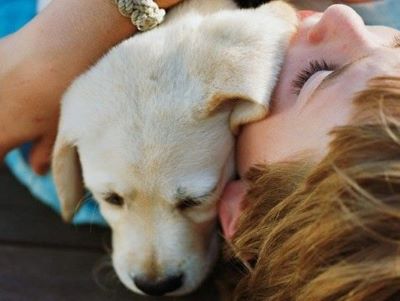Do you know? Autism is like a puzzle of feelings that we try to understand. It is a complex condition that affects humans and emotions. Dogs are known for their emotional depth and ability to connect with humans. Some wonder that just like us humans can dogs have autism?
In this article, we will explore how autism affects dogs and how we as pet parents can help them.

Can Dogs Have Autism?
Yes, dogs too can have autism. Autism is a condition which hampers the dog’s brain functioning and development, it also affects their social abilities. Though autism is majorly seen in humans, it still can affect dogs too.
Autism[1] in dogs is quite similar as they too face symptoms like repetitive behaviour, communication difficulty, problems in socializing and dysfunctionality. Normally autism in dogs is also considered CBD Canine Dysfunctional Behaviour.
If your dog is facing autism here’s how you can help them to deal with it:
- Have a fixed routine for your dog, for feeding, walking and playtime.
- Keep your dog busy with mentally stimulating exercises like puzzles. This will help to boost their mental strength.
- If your dog behaves weirdly then instead of punishing them use positive reinforcement to deal with them.
Dogs have filled a unique niche in our lives as man’s best friend. Through the process of domestication and natural selection, dogs have adapted many things via socializing with humans. Dogs can read facial expressions, display empathy, and even watch TV.
Researchers from the University of Chicago found several groups of genes in humans and dogs. Including those related to diet and digestion have evolved together.

While autism is a complex human condition involved with unique patterns, the concept of autism in dogs is still debated among experts. Dogs show a wide range of behaviours and emotions, some may relate that to autism.
“Studies suggest that dogs with this disorder lack certain neurons which are necessary for brain development, these are called “mirror neurons”. Without these, a dog is unable to develop these social skills, similar to humans with autism spectrum disorder”, confirms Dr Katie Grzyb at PetMD.
However, it is difficult to diagnose autism in dogs due to the lack of evidence. Vets rely on the comparison of normal versus abnormal behaviours. Here are some behaviours to look for in dogs[2]:
- Anti-social behaviour
- Lack of focus
- Obsessive-compulsive behaviours
- Poor reaction to stimuli
- Sensitivity to sounds
- Lethargy

Is There Autism Test for Dogs?
There is currently no “Dog autism test” or definitive way to diagnose autism in dogs, your vet can give you insights into what may be going on with your pet.
If you ever feel concerned that your dog may have some dysfunctional behaviour that it is recommended to consult with your vet. Your vet may recommend some behavioural testing, bloodwork, and possibly advanced imaging of the brain such as an MRI or CT scan.
It is still unclear what causes autism but some research suggests that there may be a genetic component in this condition. Dogs with certain breeds, such as German shepherds and collies, may be more likely to develop autism.
Handling Autism in Dogs
For dogs with high-functioning autism, calming supplements may help to reduce symptoms such as hyperactivity and destructive behaviours. These products typically contain chamomile, lavender oil, and other ingredients that can have calming effects on dogs.

There are also dog puzzles designed to engage the dog’s mind that require them to figure out how to get the treats or other rewards.
Treat-dispensing balls have a small hole in the centre that allows treats or kibble to be dispensed as the ball is played.
Noice-cancelling headphones can also be used when travelling and in hotel rooms to keep your dog quiet from noisy neighbours.
Herbs such as turmeric offer antimicrobial, anti-inflammatory, and antioxidant effects to the body this can improve the health and gut so that some symptoms may be lessened[3].
Ashwagandha helps get rid of attention issues, memory deficit, and other disorders which are prime features of autism, while some other herbs may help with anxiety and depression.
Secure space, regular exercise, and positive reinforcement can also benefit in some way in dogs with this condition.
Providing a calming environment at night can also help, as autistic dogs may be more prone to stress or anxiety that leads to dog hiccups at night.
Other Conditions Similar to Autism
There are some conditions that resemble autism in dogs. Here are some of them:

- Canine compulsive disorder: Dogs in this condition have repetitive movements that may resemble autism.
- Social pragmatic communication disorder: There are dogs who do not seem to communicate with other dogs appropriately, this is also a signature trait found in people who have autism.
- Sensory processing disorder: Dogs with this condition can lead to unusual reactions to sensory stimuli. This can include hypersensitivity to touch, sound, or light.
- Anxiety disorders: Dogs with anxiety disorders may display repetitive behaviours, such as spinning, licking their paws excessively, or barking at nothing.
Some dog owners may wonder if unusual nighttime behaviors like whimpering or kicking in their sleep could be a sign of autism or other conditions. This leads to questions like do dogs have wet dreams?
Some of these conditions may resemble autism in dogs. However, researchers believe that canine dysfunctional behaviour is the closest equivalent to autism in dogs.
FAQs
Treatment for Autism in Dogs?
There is no one-size-fits-all approach to treating dogs with autism, but there are several effective strategies. These include behavioural therapy, environmental enrichment, canine assistive technology, and medications.
What Are the Signs of Autism in Dogs?
However, some common signs to look out for include a lack of interest in social interaction with other dogs or humans, difficulty making eye contact, and a tendency to engage in repetitive behaviours such as tail chasing or paw licking.
How to Treat an Autistic Dog?
Providing a safe space for your dog is essential to help lessen their fearful tendencies. If your dog might be autistic, offering a dog bed or kennel may help them feel safe and secure especially when there are other people or dogs around.
Can Dogs Have Autism?
While there is still much to learn about autism in humans, we do know that it can occur in dogs as well. Like humans, dogs with autism may exhibit a range of behaviours, including social withdrawal, unresponsiveness to people or surroundings, and hyperactivity.
Are Disabled Dogs Happy?
Disabled dogs can still have a happy and healthy life; it takes a little extra effort. By following these tips, you can help make sure your disabled dog is happy and healthy. Just remember to give them lots of love and attention and take care of their physical and emotional needs.
Summary
In conclusion, Autism is a unique and complex condition, there are other conditions as well that may resemble autism, so it is essential to approach the condition with patience and sensitivity.
You may consider talking with an expert and taking advice from the vet whenever possible, to provide the best care to your dogs, as dogs are our companions with whom we share the world of compassion and empathy! 🐾
Lyme disease is another condition that can cause behavioral changes in dogs, like increased anxiety or lethargy. If you live in an area with a high prevalence of ticks that carry Lyme disease, your vet may want to test for it. Learn more about can dogs get lyme disease.
Reference:
- What is autism? | Autism Speaks. (n.d.)- Autism Speaks
- Chu, S. (n.d.). Can Dogs Be Autistic? 6 Signs To Look For– OSD
- Prasad, S. (2011). Turmeric, the golden spice. Herbal Medicine – NCBI Bookshelf- NIH



